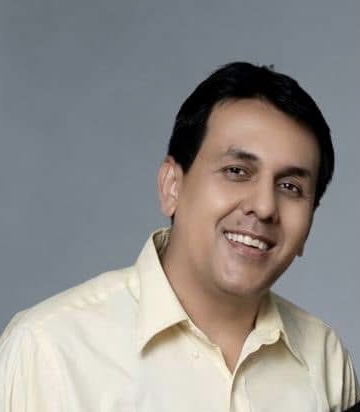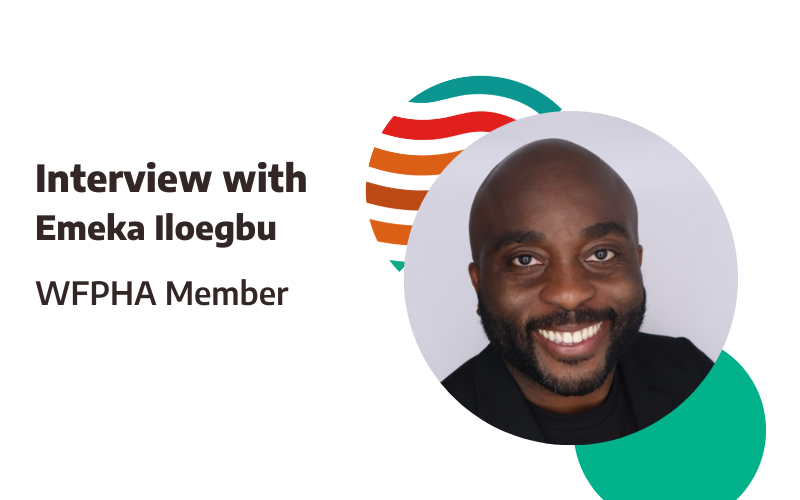Public health is more than just medicine and science. It’s about people, policy, and the bridges we build between them. In this insightful interview, Bettina Borisch, CEO of the World Federation of Public Health Associations (WFPHA), sits down with Emeka Iloegbu, a dedicated public health leader, educator, and advocate. From his early days as an intern at WFPHA to his current roles in global health policy and laboratory epidemiology, Emeka shares his journey, the challenges of global health governance, and the importance of passion in driving meaningful change.
Their conversation covers the transformative potential of the Pandemic Treaty, the critical role of diagnostics in public health, and the geopolitical challenges facing global health today. Emeka’s optimism and commitment to equity, accountability, and community-driven solutions offer a refreshing perspective on how we can collectively shape a healthier future.
From Intern to Global Health Leader: Emeka’s Journey
Bettina Borisch: Hello, everyone! My name is Bettina Borisch, CEO of the World Federation of Public Health Associations. Today, I have the pleasure of speaking with Emeka Iloegbu, a long-standing pillar of our federation. Emeka, could you introduce yourself?
Emeka Iloegbu: Absolutely. First, I’d like to thank you, Bettina, and the WFPHA for this opportunity. My name is Emeka Iloegbu. I’m an assistant program director and professor at the City University of New York in a laboratory science program. I’m also a laboratory epidemiologist and microbiologist, working in various labs during multiple health emergencies.
I represent WFPHA in several capacities, including at the United Nations headquarters in New York. I serve on the Global Health Policy Task Force and co-chair the Public Health in Emergencies and Disasters Working Group. Additionally, I’m engaged in fieldwork with Geneva-based organizations like Market Access Africa. I’m thrilled to be here and dive into this conversation.
Bettina: Listening to you, one might wonder how you managed all this simultaneously! It must have started somewhere. Where did your journey with WFPHA begin? I remember you were an intern with us years ago. How was your first day?
Emeka: The memories are flooding back! My public health journey has two trajectories, and it started with my mom. When she came to the U.S. from Nigeria, her first job was as a public health nurse. As a kid, I’d sit in the car watching her go door-to-door with surveys, not fully understanding what she was doing, but that planted a seed.
Fast forward to 2017: I was in my second year of my MPH at Mount Sinai Icahn School of Medicine, working an overnight shift in a hematology lab at NYU. I wanted to understand global health policy, so I Googled and found WFPHA. I sent an email with my CV, and soon enough, I was in Geneva.
My first day was an adventure—arriving without a proper SIM card and navigating from the airport to Plan Palais at 8:30 PM. But stepping into Campus Biotech was amazing. Those three months as an intern were transformative. I was eager to learn, meet people, and even walk into UNHCR out of curiosity. That energy and passion have only grown since.
Bettina: You attended the World Health Assembly (WHA), your first immersion into global health diplomacy. What was that like?
Emeka: It was a sight to behold. Seeing 194 countries, civil society organizations, and advocates in one place, my worldview expanded. I sat in the upper deck with medical and pharmacy students, some of whom I’m still connected to today. There was live music, a symphony, and it felt like a celebration. That experience reshaped how I saw global health.
The Pandemic Treaty and Global Health Governance
Bettina: Now, you’re deeply involved in the Pandemic Treaty negotiations. What are your thoughts on its potential impact?
Emeka: The treaty could transform global health governance by introducing legally binding norms on preparedness, data sharing, and equitable access to countermeasures. Our task force focuses on embedding equity, accountability, and local ownership into the treaty. We advocate for:
– Inclusive decision-making (civil society, public health associations, community voices).
– Sustainable financing for health systems.
– Technology transfer and capacity-building.
The challenge is bridging the trust gap between high-income and lower-income countries. High-income nations prioritize sovereignty and intellectual property protection, while others emphasize solidarity and justice. Without equitable implementation, the treaty risks becoming just another document.
Bettina: Your role extends beyond the treaty. You guide WFPHA members through the UN system in New York.
Emeka: Yes! Whether it’s TB, mental health, or NCDs, our task force applies a systems-thinking lens. We assess complex issues, offer nuanced insights, and support member associations in advocacy. It’s about ensuring diverse voices shape global health policies.
The Lab and Public Health: An Overlooked Bridge
Bettina: We both have a soft spot for lab work. How do you see diagnostics fitting into public health?
Emeka: The lab is the frontline of pandemic detection. Without timely, accurate diagnostics, surveillance collapses. My fieldwork in Zambia highlights the need for universal access to diagnostics, especially for mobile and vulnerable populations.
Now, with AI and machine learning revolutionizing diagnostics (like automated HIV testing), we must ensure these innovations reach everyone, not just high-income countries.
Global Health Challenges: Optimism Amidst Crisis
Bettina: Global health faces immense challenges, including climate change, AMR, and geopolitical tensions. How do you stay hopeful?
Emeka: I’m a glass-half-full person. Yes, we face climate-driven health crises, AMR, and inequities, but we’re also seeing progress. Decolonization conversations are growing, and young professionals are stepping up, like at the UN General Assembly last year.
My message? Don’t ignore your passion. In a world of challenges, let your drive for change guide you.
Conclusion
Emeka Iloegbu’s journey, from watching his mother’s public health work to shaping global policy, highlights the power of passion and persistence. His insights remind us that public health is not just about science but about people, equity, and bold systemic change.
As the world prepares for the WHA’s vote on the Pandemic Treaty, Emeka’s work underscores a critical truth: global health is a collective responsibility. Whether in labs, policy rooms, or communities, each of us has a role in building a healthier, fairer future.
To the next generation of public health leaders: Follow your passion, embrace challenges, and keep pushing forward. The fight for equity and health justice is far from over, but with voices like Emeka’s leading the way, the path ahead is brighter.













Recent Comments